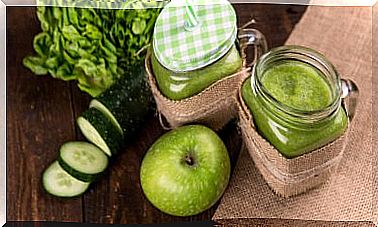Suitable Foods For Hypothyroidism
Hypothyroidism is a condition in which the body does not produce enough thyroid hormone , so these people have a slow metabolism. The most common cause is Hashimoto’s thyroiditis or autoimmune thyroiditis , which results in an inflammation of the thyroid. Above all, it should be noted that there are effective treatments for this condition. In addition, in this article you will learn how to improve treatment by consuming suitable foods for hypothyroidism.
Symptoms of hypothyroidism

The symptoms of hypothyroidism are weakness, fatigue, weight gain or difficulty losing weight, dry hair, hair loss, hair and brittle nails, dry skin pale and rough, menstrual cycles abnormal, intolerance to cold, constipation, cholesterol elevated, frequent muscle aches and cramps, memory loss, depression, irritability and decreased libido.
We recommend you read: What are the differences between hyperthyroidism and hypothyroidism?
Suitable foods for hypothyroidism
It is important to lead a healthy lifestyle, where there is a nutritious diet and regular physical activity; as well as stress management techniques and medications prescribed by your doctor for hypothyroidism.
There is no food that can cure or prevent disease. However, the effects of weight gain can be counteracted by eating low-calorie, nutrient-dense foods. Above all, it seeks to increase the immune response and prevent diseases.
It is ideal to eat a healthy diet, with foods such as fruits, vegetables, complex carbohydrates – such as whole grains, pasta, potatoes, root vegetables, legumes -, lean proteins and healthy fats in moderation. In general, these are the right foods for hypothyroidism
Omega-3 fatty acids

They are very important for brain function and necessary to keep your thyroid healthy. The Omega-3 fatty acids can reduce inflammation that causes slow thyroid function. Foods high in Omega-3 fatty acids include flaxseed oil, salmon, and oily fish, such as tuna, cod, and mackerel, and to a lesser extent, walnuts.
If you are prescribed blood-thinning medications, talk to your doctor before increasing your intake of Omega-3 fatty acids from your diet, as they can cause increased bleeding.
We recommend you read: 7 forbidden foods if you suffer from hypothyroidism
Group B vitamins
Another type of food suitable for hypothyroidism are those that have B complex vitamins. It should be noted that they stimulate the thyroid gland in hormonal production. Especially vitamin B12, indicated in anemia and low thyroid function. Foods high in B12 include clams, organ meats, meat, eggs, milk, fortified cereals, seaweed, and brewer’s yeast.
B9 is another important B vitamin for thyroid function and can be found in legumes, avocados, oranges, cabbage, asparagus, spinach, cauliflower, wheat germ, and small amounts in dairy.

Selenium
Foods rich in selenium help the body to start the thyroid hormones so that they can fulfill their functions in the body. In addition, this mineral has antioxidant effects that help protect the thyroid gland against free radicals.
Some foods that contain selenium include: Brazil nuts, tuna, sardines, eggs, and legumes. Avoid taking it in supplements unless your doctor recommends it.
Foods that can be harmful
Goitrogens are compounds that can interfere with thyroid function. Notably, they are similar to human hormones, such as estrogen, and act similarly in the body.
Similarly, these foods contain goiter-generating compounds, so these foods should be limited. Cruciferous vegetables contain goitrogenic substances, such as cabbage, broccoli, Brussels sprouts, soybeans and their derivatives. Therefore, they can adversely affect those who suffer from hypothyroidism.
In conclusion
In conclusion, we recommend that you first see your doctor before making any changes to your lifestyle. In fact, it is the doctor who must diagnose and treat this disease. However, as a complement to medical treatment, you can use these guidelines to find out which foods you should avoid the most. On the other hand, you have the recommendations of the foods that go well for this disease.
Finally, we recommend being consistent with treatment and diet to achieve a better prognosis for the disease. Notwithstanding the foregoing, we recommend that you expand as much information as possible in the bibliographic sources.









